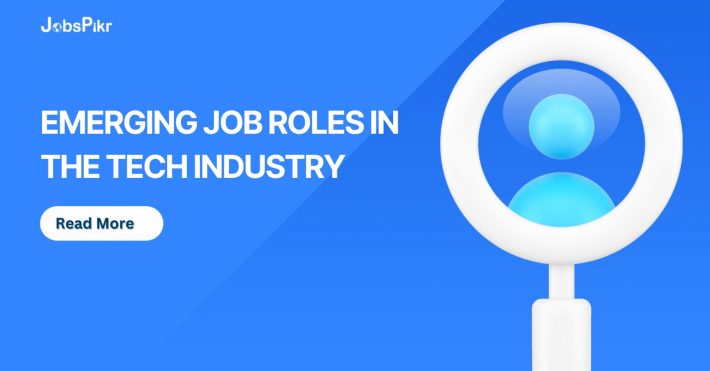The job market is subject to fluctuations brought on by factors like economic conditions, technological advancements, and changes in consumer demand. Of these three, technological advancements have had the biggest effect on the job market. This is not a new phenomenon and we are not talking about AI and Machine Learning here. The industrial revolution with its inventions like electricity, the steam engine, the power loom, and the telegraph had a massive effect on the job market. Ever since the late 18th Century, innovations and breakthroughs have changed the way humans have built things. As a result of this, job roles have continuously changed from time to time and new and emerging job roles have replaced older ones.
With the advent of the 21st century, technological innovation especially in the world of computing has seen breakthroughs very frequently. Popular research topics like VR (virtual reality) and AI (Artificial Intelligence) were coined and discussed in the 1900s but their usage has increased in recent years. This has been due to two major factors-
- Tons of researchers and corporates have been working continuously to build on top of the knowledge bedrock that was previously laid.
- There are more commercial products available to the masses today with such new-age technology than ever before. For example, gaming on VR headsets is quite common now, and so is using ChatGpt to get answers to your questions.

If you own a job board or a job website, it will be important for you to keep track of what are the most in-demand roles as well as the ones that will boom soon. You can do this only if you are tracking the pulse of the job market through ground-level data. Given that the tech job market is the one that is highly targeted by job boards, let’s discuss some of the most sought-after roles in the sector–
Artificial Intelligence (AI) and Machine Learning (ML) Engineer –
Given the rise of new ML-based tools and open-source libraries, every company is trying its hand to best utilize these technologies. This in turn has put machine learning engineers in high demand. Given that there aren’t many college degrees that intrinsically teach these subjects, people with prior working experience are the most sought-after for this position. The experience could be gained by working on open-source projects or taking up online courses. Many even learn on the job and transform themselves from software engineers to ML engineers. These engineers are in charge of designing, testing, and building AI tools that can be used for
- Biomedicine
- Marketing
- Predictive analytics (like recommender engines on websites like Netflix)
- Image or speech recognition
- Autonomous systems (like Tesla’s self-driving cars)
- Natural Language Processing
Data Scientist –
The 21st century has seen more data than ever before- petabytes of publicly accessible data being created every day. This data contains logs, data from devices connected to the internet, websites on the internet, and more. Data Scientists help consume both public and internal data so that companies can make data-backed decisions. Finding trends and usable information from an ocean of data is like finding a needle in a haystack unless you have a data scientist guiding you. Most data scientists have an advanced maths or a computer science degree although you will find converted software developers as well.
Cloud Architect –
AWS, GCP, and Azure are the top 3 cloud service providers now and almost every company that has a server is running it on the cloud. Running resources on the cloud instead of owning them is cheaper for companies. However, companies need to bank on cloud architects who can-
Cloud architects are usually software developers with experience in building things for the cloud.
Cybersecurity Analyst –
Cyber threats and data theft combined with new rules and regulations for data storage, access, and usage have increased the level of vigilance at tech companies that deal with user information. They help companies identify vulnerabilities early on, and recommend countermeasures to prevent future attacks. Cybersecurity analysts are often hired by big companies to ensure that their data is safe and cannot be accessed by unwanted entities. Some companies also hire agencies who in turn help them do a security audit from time to time. Cyber security is not taught to the undergrads in most colleges so applicants are instead software engineers who have experience in cloud infra as well as data storage protocols.
Full Stack Developer –
Ever since the advent of the internet, “web developers” or those who can design websites have been in high demand. Although the term is loosely used, “full-stack developer” usually refers to those with both front-end and back-end experience. Some jobs also require them to have experience in setting up infra on the cloud so that they can design a website and make it accessible to millions– all by themselves.
On top of these Emerging Job Roles which you will see most frequently on tech-job boards or career pages of tech companies, some emerging job roles will see more openings shortly. Some of these are–
AI Trainers –
AI is powered by new algorithmic breakthroughs, but at the heart of it all, lies data. Unless AI models and systems are trained correctly, their results will either have loads of errors or start deteriorating with time. As more companies take on AI-based tools and applications, more AI trainers will need to be hired to train AI models on different data points. These training activities can be related to NLP-based projects, image recognition, or recommender engines. Individuals with experience in developing ML models or those having domain-specific knowledge are likely to be hired for such roles.
Quantum Computing Engineer –
This is an emerging field in which computation is done using quantum bits or qubits. These qubits can potentially process data a lot faster than traditional computers. Faster processing of data can in turn open avenues where data processing couldn’t have been applied earlier. A background in Physics, Computer Science, or Mathematics is usually required to get into this arena. Candidates applying to such roles usually have a master’s or Ph.D. degree in which they have taken up specific courses related to quantum computing.
Digital Health Specialist –
Healthcare is highly digitized today, and without the many machines at their disposal, doctors would not be able to provide the level of service that is expected. Since medical machines are getting more complicated every year, individuals with knowledge of both medical sciences as well as computation, are needed to provide certain services. These can range from planning out digital health strategies to running robotic surgeries. Medical professionals who have used these machines as a part of their Emerging Job Roles, or taken up advanced programs would fit the bill for such openings.
Edge Computing Engineer –
Edge computing refers to the processing of data and storage closer to its source instead of in a centralized location. This causes less latency when doing complex processes. For example, certain applications on your phone may require seconds or even minutes to perform certain actions. This is because it is sending data to a cloud server where the data is validated and processed and the results are again sent to your device via the web. Edge engineers design solutions where all of this can happen right where the data is generated– your phone, IoT devices, laptops, and more. Software engineers with hardware knowledge can get into this field by upskilling. This sector is likely to see growth with more complex applications being brought into our palms.
Robotics Engineer –
Designing, building, and testing robots required for industries like manufacturing, healthcare, logistics, and mining requires personnel who have experience in both software and hardware. One common example is building different types of drones for specific use cases. An engineering degree with a strong foundation in computing and maths is required for this. Familiarity with robotics hardware such as sensors and CAD software is also important.
If you own a job board, you can use all this information to drive more traffic to your website. You can create a separate webpage for the trending jobs. You can also create different web pages for certain niche sectors of tech jobs. This will help save time for job seekers who will not need complex filters to find the best-suited Emerging Job Roles. You can also use SEO optimization to drive more organic traffic. You will find many articles by SemRush that list down the different ways in which your website can be more SEO-optimized.
In turn, businesses that post jobs on your website will also get a better applicant set. All this would be possible only if you have your hands on job market data in real-time. With a real-time job market feed, you will be able to constantly monitor which skills, profiles, titles, and roles are trending each week or month. You can also figure out how major technological breakthroughs or worldwide events impact the job feed.
Our talent intelligence platform JobsPikr enables you to do all of the above. Some of the common use cases to which companies apply our tool are–
- Trend Analysis
- Skill-requirements analysis
- Matching candidates with Emerging Job Roles
- Designing Coursework based on industry requirements
- Salary benchmarking
- Talent intelligence
We offer a hassle-free solution to enable your job board to grow by leveraging data. Simply schedule a call with our expert, share your problem statement, and we’ll take care of the end-to-end setup and maintenance. Our team has extensive experience in creating comprehensive job-data solutions, making us one of the most sought-after services for corporates and job websites looking to deep dive into the ocean of job data. With our data-backed solution, you can make informed decisions and drive better outcomes for your business.



